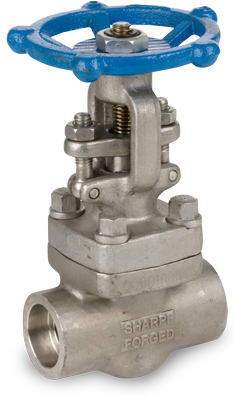Class 800 Gate Valves: High-Pressure Performance for Demanding Applications


In high-pressure industrial systems, valve integrity is critical. When it comes to reliable isolation in piping systems operating at elevated pressures and temperatures, Class 800 gate valves are a trusted solution. These compact, forged steel valves are engineered to meet rigorous ANSI and ASME standards for demanding applications in oil & gas, chemical processing, power generation, and more.
In this post, we break down what Class 800 means, explore gate valve functionality, materials, design variations, and common use cases, giving you the knowledge to specify the right valve for your high-pressure system.
What Is a Class 800 Gate Valve?
A Class 800 gate valve is a pressure-rated isolation valve designed in accordance with ASME B16.34 and API 602 standards, typically constructed from forged steel or alloy for high strength and durability.
Key Characteristics:
-
Pressure Rating: 800 class (nominal pressure class per ASME)
-
Construction: Forged steel (commonly ASTM A105, F316, F11, etc.)
-
Ends: Available in male and female threaded (NPT) or socket weld (SW).
-
Sizes: Typically ½” to 2” nominal pipe size (NPS)
-
Operation: Rising stem manual handwheel
How Gate Valves Work
Gate valves operate by lifting a flat or wedge-shaped disc (gate) out of the flow path. They are designed to be either fully open or fully closed and are best suited for applications where minimal pressure drop and tight shutoff are required.
In a Class 800 configuration, the valve is engineered to handle:
-
Working pressures up to 1975 PSI @ 100°F
-
Elevated temperatures, depending on the material grade
-
Corrosive or high-cycle service, with appropriate trim and body materials
Common Materials for Class 800 Gate Valves
| Body Material | Standard | Application Notes |
|---|---|---|
| ASTM A105 | Carbon Steel | General service, low-temp, steam, gas |
| ASTM F316/F316L | Stainless Steel | Corrosion-resistant, foods, chemical use |
| ASTM A182 F11/F22 | Chrome-Moly Alloy | Elevated temp/pressure, steam, refining |
| Monel, Inconel | Special Alloys | Severe chemical/corrosion applications |
Trim options (internal parts) also vary to match process media, including stainless, hard-faced, or alloy combinations. More on trims in another post.
Design Standards & Options
Class 800 gate valves are often manufactured to API 602 or ASME B16.34 specs, ensuring performance under high stress. Key design options include:
-
Bolted bonnet or pressure seal bonnet
-
Integral or renewable seat rings
-
OS&Y (Outside Screw & Yoke)
-
Full port or standard port
-
Fire-safe construction
For oil & gas or refinery service, valves may include NACE MR0175 compliance for sour gas compatibility.
Industrial Applications
Class 800 gate valves are ideal for:
-
Steam and boiler systems
-
Petroleum refining and hydrocarbon processing
-
Power generation (thermal and nuclear)
-
High-pressure chemical and gas service
-
Compressor stations and gas distribution
-
Marine and offshore platforms
Their compact forged bodies and high-pressure ratings make them particularly valuable in skid-mounted equipment and tight piping runs where space and reliability are both critical.
Class 800 vs. Other Pressure Classes
| Feature | Class 150 | Class 300 | Class 800 |
|---|---|---|---|
| Pressure Rating (PSI @ 100°F) | ~285 PSI | ~740 PSI | ~1975 PSI |
| Material Types | Cast, forged | Cast, forged | Primarily forged |
| Applications | General purpose | Medium pressure | High pressure |
| Typical Sizes | ½"–24"+ | ½"–24"+ | ½"–2" |
Note: Pressure ratings vary based on material and temperature.
Sourcing Class 800 Gate Valves
At Hayward Pipe & Supply Co., we stock and source Class 800 gate valves from all industry-leading brands.
Whether you're specifying for a new build or replacing valves in a critical process, our technical experts can help you select the right size, material, trim, and end connection for your needs.
Conclusion
Class 800 gate valves are built for performance under pressure. With rugged forged bodies, high working pressure ratings, and versatile materials, they’re trusted across some of the world’s most demanding industries.
If you're engineering a high-pressure fluid system, don’t cut corners on isolation; choose a valve that delivers safety, strength, and reliability.

